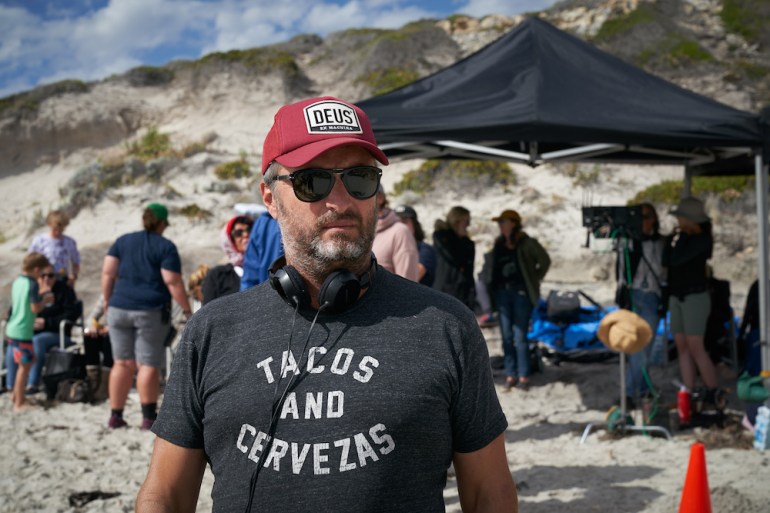Gregor Jordan on the set of ‘Dirt Music’. (Photo: Kerry Brown)
Once cinemas reopen, Universal Pictures intends to give Dirt Music a wide release – something director Gregor Jordan is thankful for.
Shot in Western Australia and based on Tim Winton’s Miles Franklin-winning novel, the film made its world at the Toronto International Film Festival last September.
It stars Kelly Macdonald as Georgie, a sometime sailor, diver and nurse who is stranded in a remote fishing town with Jim (David Wenham), a man she doesn’t love, and his young sons whose dead mother she can never replace. A reckless moment leads Georgie to an intense, sexually charged affair with Lu Fox (Garrett Hedlund), an enigmatic loner, musician and poacher who is traumatised by a tragic accident from his past.
When Lu retreats into the wilderness, Georgie embarks on a journey to bring him back with the unlikely help of Jim, who is determined to right wrongs from his own past. The cast also includes Julia Stone, George Mason, Chris Haywood, Dan Wyllie and Aaron Pedersen.
Jordan (Two Hands, Ned Kelly, Buffalo Soldiers) had always been a fan of Winton’s novel – in fact, he’d read it even before it came out, as it had been sent around to various writers and directors to pique interest in an adaptation.
Indeed, for almost a decade Phillip Noyce was set to direct the drama with Rachel Weisz, Nicole Kidman, Heath Ledger, Colin Farrell and Russell Crowe all variously in the frame as leads.
“At the time, I was at a very different stage in my life and I was very intimidated by it. I had no idea how I would go about trying to turn that into a film,” Jordan tells IF.
Many years later, when producer Finola Dwyer (Brooklyn, An Education) asked Jordan over dinner if he would be interested in looking at a Dirt Music screenplay penned by Jack Thorne (The Aeronauts, Wonder), he mostly said yes out of curiosity.
He was instantly impressed with how Thorne had corralled the “massive novel” into a script while still capturing a sense of place, the characters’ journeys and emotion, as well as a sense of loss and loneliness.
“It just had such a great feel and tone to it. He really added something that wasn’t there in the book as well; there was an element of creation that somehow tied it all together but captured the essence of the book.”

Wildgaze’s Dwyer produced the film with Amanda Posey, and Aquarius Films’ Angie Fielder and Polly Staniford, and Jordan worked with Thorne to further develop the script for about six months.
Pivotal to the director was capturing the essence of WA, not only visually, but in the storytelling itself.
“One of the things that I think is very important in all of Tim Winton’s writings is a sense of place and particularly a sense of the landscape of Western Australia.
“Having grown up in the ocean myself, that was something that I thought was very important to the tone of the piece but also to the actual storytelling; all the characters are people who just spend their whole lives in water, and live right on the ocean. That transition of land to ocean, that sort of almost spiritual relationship with those places, was so entrenched in the novel. It was very important to give that meaning to the film as well.”
In terms of the casting of McDonald and Garrett, Jordan says they didn’t necessarily set out to have two international leads; it just happened that way. They were right for the roles and could nail the Aussie accent.
“Casting is a very abstract business at the best of times; you’re not necessarily in control. Really, the actors that you end up with – it’s almost like the universe provides you with them. Trying to find actors who are exactly right age, who had just the right essence that they could bring to play those characters well, who had some sort of marquee to be able to justify the budget and were available – it was really difficult.”
Jordan is grateful Universal has opted to release the film theatrically later this year. He finds it hard to predict what the appetite for cinemagoing will be when restrictions ease, but says: “The fact that we’re talking about theatrical distribution in Australia is reflective of the fact that they’re anticipating that cinemas are going to be opened again pretty soon, and people are going to want to go.”
As for who the audience for the film is, Jordan says it’s mostly pitched an an older audience. He describes the film as “unusual” in that it contains elements of “borderline magic realism”, noting it may not be for everyone.
“There’s a very beautiful spiritual element to it, that I think is brilliant and I love. But it’s a bit out there. The ideas that Tim Winton created are very unusual; it’s not a straightforward kind of story at all.
“It’s funny as a filmmaker, because at the end of the day, you love it yourself and that’s the reason you want to be involved. And you do your best to sort of put your ideas out there in the clearest way. But how an audience ends up responding to it, you really don’t have much control over. Who likes it, who doesn’t like, is hard to predict sometimes. It will be really fascinating to see who loves this film.”


